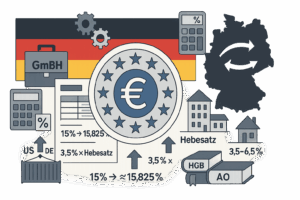German Business Tax Guide
Germany’s business tax landscape combines accounting duties with several key taxes that interact in practice. This German Business Tax Guide gives you a concise overview of the essentials and points you to the specifics that matter most. Use the table of contents below to jump straight to the topic you need.
German Business Tax Guide – Accounting, Corporate Tax, Trade Tax, VAT & Real Estate Transfer Tax
1. Accounting and Bookkeeping Obligations
Before considering corporate taxes, businesses in Germany must comply with strict accounting and bookkeeping obligations. The legal framework is defined in the Handelsgesetzbuch (HGB) and the Abgabenordnung (AO).
Who is required to keep books?
- All corporations (e.g. GmbH, AG) are required to maintain double-entry bookkeeping.
- Partnerships and sole proprietors are obliged if revenue exceeds EUR 600,000 or profit exceeds EUR 60,000 per fiscal year.
Financial statements
Corporations must prepare annual financial statements consisting of at least a balance sheet and a profit and loss statement. Depending on size, additional disclosures and a management report may be required.
Filing and publication
Financial statements must be filed electronically with the Federal Gazette (Bundesanzeiger) within defined deadlines. Penalties may apply in case of late filing or incomplete disclosure.
Tax accounting vs. commercial accounting
Taxable income is based on commercial accounts under HGB, adjusted by specific tax rules from AO and other tax acts. This means businesses must reconcile differences between commercial and tax accounting.
2. Corporate Tax (Körperschaftsteuer, KSt)
Corporations resident in Germany are subject to corporate income tax on worldwide profits. The rate is 15%, plus a 5.5% solidarity surcharge, resulting in an effective burden of approximately 15.825%.
3. Trade Tax (Gewerbesteuer, GewSt)
Trade tax is levied on business profits. Calculation starts with taxable income adjusted under AO, multiplied by a base rate of 3.5%, then by the municipal multiplier (Hebesatz). Effective burdens vary between 14% and 20% depending on location.
Impact on legal forms
Corporations pay trade tax in addition to corporate tax. Partnerships and sole proprietors can credit part of the trade tax against personal income tax.
4. Value Added Tax (Umsatzsteuer, USt)
VAT applies to most supplies of goods and services in Germany. The standard rate is 19%; a reduced rate of 7% applies to essential goods such as books and food. Businesses can reclaim input VAT if registered and compliant.
5. Real Estate Transfer Tax (Grunderwerbsteuer)
This tax applies to the acquisition of German real estate or certain share transfers in real estate holding entities. The buyer usually pays the tax. Rates depend on the state (Land) and range between 3.5% and 6.5%:
- Bavaria: 3.5%
- Baden-Württemberg, Bremen, Lower Saxony, Rhineland-Palatinate, Saxony-Anhalt, Thuringia: 5.0%
- Hamburg, Saxony: 5.5%
- Berlin, Hesse, Mecklenburg-Western Pomerania: 6.0%
- Brandenburg, North Rhine-Westphalia, Saarland, Schleswig-Holstein: 6.5%
6. Conclusion
German business taxation combines multiple layers: strict bookkeeping duties under HGB and AO, corporate tax, municipal trade tax, VAT, and real estate transfer tax. Careful planning of legal form, business structure, and location is crucial to optimize the effective tax burden.


